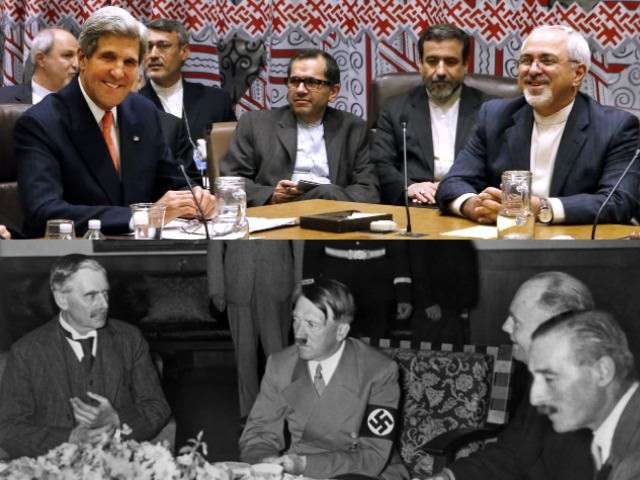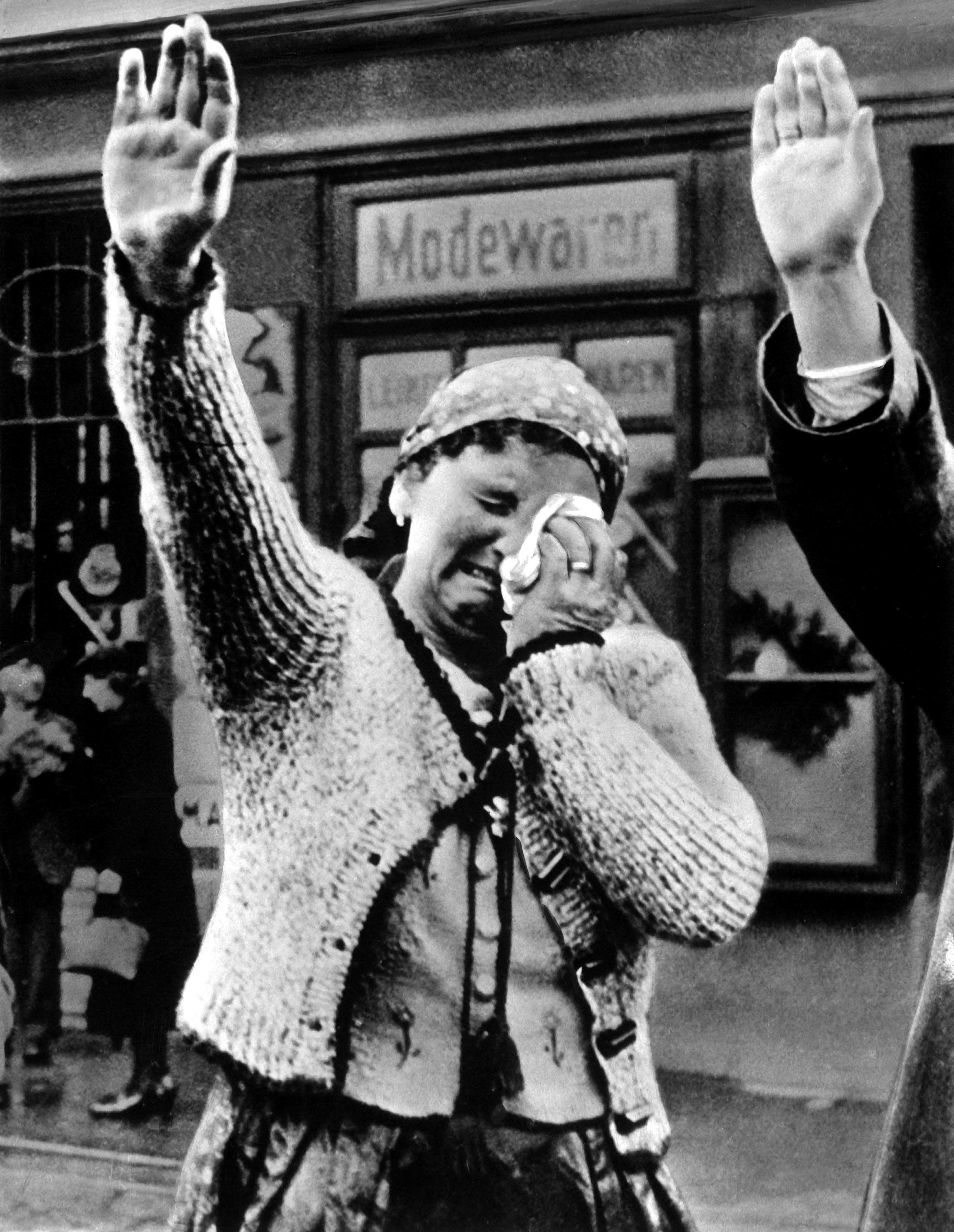The Boys Who Cried "Munich"

Was it really only 55 days ago that the world—including the part inhabited by Republicans—rolled its collective eyes at U.S. Secretary of State John Kerry bizarrely mischaracterizing the decision whether or not to bomb the regime in Syria as our latest "Munich moment," referencing the deservedly infamous 1938 Neville Chamberlain/Edouard Daladier hand-over of Western Czechoslovakia to Adolf Hitler without Czech input and despite the fact that Paris was a military ally of Prague? Go ahead, watch Kerry haunt our consciences with the warning that the eventual outcome of the August/September Damascus deliberations would amount to "appeasement":
As conservative Rod Dreher asked at the time,
If American cruise missiles don't fly into Damascus, will Assad annex the Mideast equivalent of the Sudentenland? I am aware that he is a nasty piece of work, but I am not aware that he is an expansionist whose desires for Syrian lebensraum threatens America's vital interests.
Not even two months later, Munich is back with a vengeance, and this time it's conservatives leading the charge against the six-country deal with Iran over its nuclear program.

In The Wall Street Journal, uber-hawk Bret Stephens declared the agreement somehow "Worse Than Munich," based on a sliding scale that takes into consideration the comparative weakness of Britain and France. (As long as we're doing historical comps here, it's worth noting that 2013 Iran is to 1938 Germany what a flea is to a Tyrannosaurus Rex.) You can calibrate Stephens's precise level of foreign policy seriousness with this passage:
After World War II the U.S. created a global system of security alliances to prevent the kind of foreign policy freelancing that is again becoming rampant in the Middle East. It worked until President Obama decided in his wisdom to throw it away.
Over at Breitbart.com, Ben Shapiro also produces a "Worse Than Munich" verdict, which suggests that the next Mideast crisis two months from now will generate such interventionist headlines as "Twice As Bad as Munich," or for the space-conscious, perhaps "Munich Cubed." Here's Shapiro's Shaperiousness:
[I]n truth, the west's appeasement of Iran is significantly worse than its appeasement of Hitler in 1938, for a variety of reasons. First, as of 1938, Hitler had not yet made clear his plans to exterminate European Jewry. He was still attempting to ship European Jews out of Europe; the Final Solution was not formally adopted until 1941. Iran has made clear its desire to wipe Israel off the map. Its current leader, supposed moderate Hassan Rouhani, has refused to acknowledge the Holocaust as historically accurate, participated in a rally calling for Israel's destruction, and according to Iranian press reports, stated, "The Zionist regime is a wound that has sat on the body of the Muslim world for years and needs to be removed." Yet the Obama administration wants to pretend he is a moderate.
Sure, Hitler demanded—successfully!—that whole swaths of other countries be ceded to him without their consent, and yes, if Iran tried that with a neighbor it would be blown to smithereens by history's most powerful military, but that Rouhani character participated in a rally!
Heritage Foundation foreign policy VP James Carafano headlines his National Review objection as "Munich II." Watch Carafano's tank think:
The British think the deal with Iran makes sense. Then, again, it was a British government that believed Munich meant we could all get a good night's sleep now.
The Russians laud the deal. But it was a government in Moscow that believed the Molotov-Ribbentrop pact solved all its problems.
Our White House likes this deal. But, our White House also thinks its policies in Iraq, Libya, Egypt, and Syria have been just super.
I happened to be on The Blaze network with Carafano the other week talking about this very subject (he sincerely believes we're heading for a nuclear winter in the Middle East), and I had the chance to ask him: OK, President Carafano, what would YOU do to more boldly confront this situation? His answer? Give sanctions more time to work. While I appreciate an answer that doesn't involve immediate U.S. bombardment, the Hitler analogy begs the question: If Nazis they truly be, how can anything be appropriate short of war?
Establishmentarian hawk Charles Krauthammer engages in neither grade inflation nor apples-to-apples comparison; instead, simply "It is the worst deal since Munich."
Of course, it is no such thing. The Yalta Conference of 1945 consigned a whole half-continent to subjugation under an evil communist empire, and American diplomats have been apologizing ever since. Agreeing to temporarily lift economic sanctions on a single country is not within the same moral time zone as sentencing entire nations to a half-century of abject misery.
More Munich/Chamberlain/appeasement talk from Rep. Tom Cotton (R-Arkansas), William Kristol, John Bolton, Cal Thomas, Daniel Pipes, and Beverly Hills Courier Publisher Clif "One F" Smith. More historical Reason pushback on the analogy, and the unsound places it has taken U.S. foreign policy, here.

Bad historical analogies do not convert the targets of their criticism to good international decisions. But they do suggest an intellectual rot among those who are once again banging the drums for preventative Middle Eastern war. All recent history points to treating their most recent claims with a prophylactic skepticism, and recognizing their go-to analogy as a crude, ahistorical gimmick to escalate military confrontation.
Bonus cinematic history trivia: Did you know that the great Czech movie director Miloš Forman was this close to making a French-financed film about the ill-fated agreement, titled The Ghost of Munich, with a screenplay co-writing credit by Václav Havel himself? Alas, the 2008 financial crisis doomed the thing.


Show Comments (98)